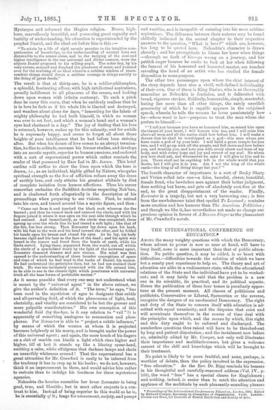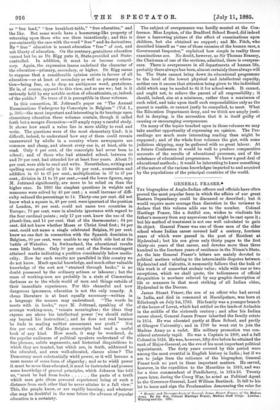THE INTERNATIONAL CONFERENCE ON EDUCATION.*
AMONG the many weighty questions with which the Democracy, whose advent to power is now so near at band, will have to busy itself, none is more important than that of public educa- tion. No public question, it may be added, is so beset with difficulties,—difficulties towards the solution of which we have but a scanty past experience to help us. The theory and art of education are alike in a rudimentary state, while the educational relations of the State and the individual have yet to be worked- out; and it may fairly be said that the problem is a new one in its scientific, its practical, and its political aspects. Hence the publication of these four tomes is peculiarly oppor- tune at the present moment. All classes of politicians and publicists, Conservative or Liberal, Spencerian or the reverse, recognise the dangers of an uneducated Democracy. The right and duty of the State to concern itself with education is ad- mitted with equal unanimity, and the disputes that exist and will accentuate themselves in the course of time deal with the principles upon which, and the means by which, this right and this duty ought to be enforced and discharged. The numberless questions thus raised will have to be threshed-out by long and patient disputation ; and the instalment now before us, admirably edited by Mr. Cowper, not only well illustrates their importance and multifariousness, but gives a welcome earnest of the skill and knowledge which will be brought to their treatment.
No point is likely to be more fruitful, and none, perhaps, is worthier of debate, than the policy involved in the expression, "free education." As the Rev. Dr. Rigg reminds his hearers in his thoughtful and carefully-reasoned address (Vol. IV., p- 169), the word " free " has a special charm for Englishmen ; and nothing, indeed, is easier than to catch the attention and applause of the multitude by such pleasantly-sounding phrases
by • Richard Cowper,the International Conference on Education, Lon don, 1884. Edited Arts. : Olowea and Soar Councils of;FI:11thtl:esehafition and StioTiety4orlr'l as "free land," "free breakfast-table," "free education," and the like. But some words have a boomerang-like property of returning upon those who use them incautiously; and this is pre-eminently the case with the word " free " and its derivatives. By " free" education is meant education " free " of cost, and not liberty of education. On the contrary, gratuitous education cannot but be, as Dr. Rigg puts it, State-provided and State- controlled. In addition, it must be or become compul- sory. Again, the expression leaves undefined the character of -the education—primary, secondary, or higher. Dr. Rigg seems to suppose that a considerable opinion exists in favour of all education—or at least of secondary as well as primary educa- tion—being free, or, to drop an ambiguous word, gratuitous. Ile is, of course, opposed to this view, and so are we ; but is it -seriously held by any notable section of educationists, or, indeed, of the public ? No trace of it is perceptible in these volumes.
In this connection, M. Jottrand's paper on "The Annual Examinations Undergone by Conscripts in Belgium" (Vol. I., p. 306)—the most important and interesting in its bearings upon -elementary education these volumes contain, though it called forth but a meagre discussion—will amply repay a careful study. It shows how small a value lies in mere ability to read and write. The questions were of the most elementary kind ; it is difficult, indeed, to understand how any of them could remain unanswered by adults in a country where newspapers are common and cheap, and almost every one is, at least, able to read. Only 6 per cent. of the conscripts had never been to school ; and of those who had attended school, between 60 and 70 per cent. had attended for at least four years. About 75 per cent. were able to read and write. Nevertheless, writing and spelling were good only in 23 to 28 per cent., numeration and addition in 63 to 67 per cent., multiplication in 37 to 47 per .cent., division in 11 to 18 per cent.,—and the lower figures, says M. Jottrand significantly, are more to be relied on than the -higher ones. In 1883 the simplest questions in weights and measures were solved by 43 per cent.; a small increase of diffi- culty reduced the percentage to 14. Thirty-one per cent. did not know what a square is, 49 per cent, were ignorant of the position of London, 46 per cent. could not name two countries in Europe; 70 per cent. were in absolute ignorance with regard to the four cardinal points ; only 17 per cent, knew the use of the plumb-line, and 14 per cent. that of the thermometer; 64 per cent. did not know whether Moses or Christ lived first ; 84 per cent. could not name a single celebrated Belgian, 96 per cent. knew no one fact in connection with the Spanish dominion in Belgium, 60 per cent, were unable to say which side lost at the 'battle of Waterloo. In Switzerland, the educational results were little better. Only 50 per cent, of the Swiss contingent -attained marks indicating a position considerably below medio- crity. How far such results are paralleled in this country we do not know. Much special knowledge, and much other valuable knowledge of the sort not "strained through books," is no -doubt possessed by the ordinary artisan or labourer ; but the mass of working-men are probably in a state of Cimmerian darkness as to the whole world of men and things outside of their immediate experiences. For this shameful and now -dangerous ignorance, education is not the only remedy. A cheap literature is at least equally necessary—written in a language the masses may understand. "The words he meets with in books," says M. Jottrand, speaking of the -average working-man, "remain meaningless ; the ideas they express are above his intellectual power [we should rather say beyond his instruction] ; and he does not read because he finds in reading neither amusement nor profit." Not five per cent, of the Belgian conscripts had read a useful book of any kind. How much, it may be wondered, do the popular audiences of political speakers understand of the fine phrases, subtle arguments, and historical disquisitions to -which they are treated, but which are, in truth, addressed to the educated, and even well-educated, classes alone P The Democracy must substantially wield power, or it will become a mere means of some form of oligarchy ; and so to wield power it must be more than educated, it must be instructed and possess some knowledge of general principles, which Johnson has told
us, "must be had from books the parts of a truth which man gets (from personal experience) being at such a distance from each other that he never attains to a full view." This, the people know, or are rapidly learning ; and whatever else may be doubtful in the near future the advance of popular education is a certainty.
The subject of overpressure was hardly mooted at the Con- ference. Miss Lupton, of the Bradford School Board, did indeed draw a harrowing picture of the effect of examinations upon children, but she obtained no support ; and Mr. Fitch, who described himself as "one of those enemies of the human race, a Government inspector," explained how simple in reality these examinations are. No doubt, however, as Sir Thomas Brassey, the Chairman of one of the sections, admitted, there is overpres- sure. There is overpressure in all departments of human life, probably there always has been, almost certainly there always will be. The State cannot bring down its educational programme to the level of the lowest physical and intellectual capacity, neither can it ensure that attention being given to the individual child which may be needed to fit it for school-work. It cannot, and ought not, to relieve the parent of all responsibility ; it should, indeed, aim at a minimum, rather than a maximum of such relief, and take upon itself such responsibilities only as the parent is unable, or cannot justly be compelled, to meet. What the Education Department deny, and we think are amply justi- fied in denying, is the accusation that it is itself guilty of causing or encouraging overpressure.
On many of the topics touched upon in these volumes we may take another opportunity of expressing an opinion. The Pro- ceedings are much more interesting reading than might be supposed ; and of the whole four volumes the gist, with some judicious skipping, may be gathered with no great labour. At a future Conference it would be well to produce comparative accounts of the results of educational processes, and of the substance of educational programmes. We know a good deal of educational methods ; it would be interesting to know something of the nature of the various knowledges imparted to and acquired by the populations of the principal countries of the world.



































 Previous page
Previous page